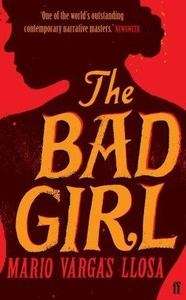The Bad Girl

Editorial Faber
Fecha de edición agosto 2008
Idioma inglés
Traducción de Grossman, Edith
EAN 9780571234110
416 páginas
Libro
encuadernado en tapa blanda
Resumen del libro
Ricardo Somocurcio is in love with a bad girl. He loves her as a teenager known as 'Lily' in Lima in 1950, when she arrives one summer out of the blue, claiming to be from Chile but vanishing the moment her claim is exposed as fiction. He loves her next in Paris, where she appears as the enchanting 'Comrade Arlette', an activist en route to Cuba, and becomes his lover, albeit an icy, remote one, who denies knowing anything about the Lily of years gone by. Whoever the bad girl turns up as - whether it's Madam Robert Arnoux, the wife of a high-ranking UNESCO official, or Kuriko, the mistress of a sinister Japanese businessman - and however poorly she treats him, Ricardo is doomed to worship her.
Gifted liar and irresistible, maddening muse - does Ricardo ever know who she really is? The answer is as unclear as what has become of Ricardo himself, a lifelong expatriate shadowed by the sense that he is only ever drifting. In Mario Vargos Llosa's beguiling new novel, the strange bedfellows of good and bad turn out not to be what they appear
Biografía del autor
x{0026}lt;P x{0026}lt;B Mario Vargas Llosa x{0026}lt;/B (Arequipa, 1936 - Lima, 2025). Premio Nobel de Literatura, su carrera literaria se inició con el estreno de un drama en Piura y el libro de relatos x{0026}lt;I Los jefesx{0026}lt;/I , pero alcanzó notoriedad con sus novelas x{0026}lt;I La ciudad y los perrosx{0026}lt;/I (1962; Premio Biblioteca Breve y Premio de la Crítica) y x{0026}lt;I La casa verdex{0026}lt;/I (1966; Premio de la Crítica y Rómulo Gallegos). Escribió piezas teatrales x{0026} x02014;x{0026}lt;I La señorita de Tacna, Kathie y el hipopótamo, La Chunga, El loco de los balcones, Ojos bonitos, cuadros feos, Las mil noches y una nochex{0026}lt;/I y x{0026}lt;I Los cuentos de la pestex{0026}lt;/I x{0026} x02014;, estudios y ensayos x{0026} x02014;x{0026}lt;I García Márquez: Historia de un deicidio, Carta de batalla por Tirant lo Blanc, La orgía perpetua, La utopía arcaica, La verdad de las mentiras, La tentación de lo imposible, El viaje a la ficción, La civilización del espectáculo, La llamada de la tribux{0026}lt;/I y x{0026}lt;I La mirada quietax{0026}lt;/I x{0026}lt;/P x{0026}lt;P x{0026}lt;I (de Pérez Galdós)x{0026}lt;/I x{0026} x02014;, memorias x{0026} x02014;x{0026}lt;I El pez en el aguax{0026}lt;/I x{0026} x02014;, relatos x{0026} x02014;x{0026}lt;I Los cachorrosx{0026}lt;/I x{0026} x02014;, obra periodística x{0026} x02014;x{0026}lt;I El fuego de la imaginación, El país de las mil carasx{0026}lt;/I y x{0026}lt;I El reverso de la utopíax{0026}lt;/I x{0026} x02014;, x{0026}lt;I Conversación en Princetonx{0026}lt;/I , con Rubén Gallo, x{0026}lt;I Medio siglo con Borges, Dos soledades, Un bárbaro en París: Textos sobre la cultura francesa, y, sobre todo, novelas: Conversación en La Catedral, Pantaleón y las visitadoras, La tía Julia y el escribidor, La guerra del fin del mundo, Historia de Mayta, ¿Quién mató a Palomino Molero?, El hablador, Elogio de la madrastra, Lituma en los Andes, Los cuadernos de don Rigoberto, La Fiesta del Chivo, El Paraíso en la otra esquina, Travesuras de la niña mala, El sueño del celta, El héroe discreto, Cinco Esquinas, Tiempos reciosx{0026}lt;/I y x{0026}lt;I Le dedico mi silenciox{0026}lt;/I . Además de los mencionados, recibió los premios Cervantes, Príncipe de Asturias, PEN/Nabokov y Grinzane Cavour. Fue miembro de la Real Academia Española y de la Académie Française.x{0026}lt;/P








